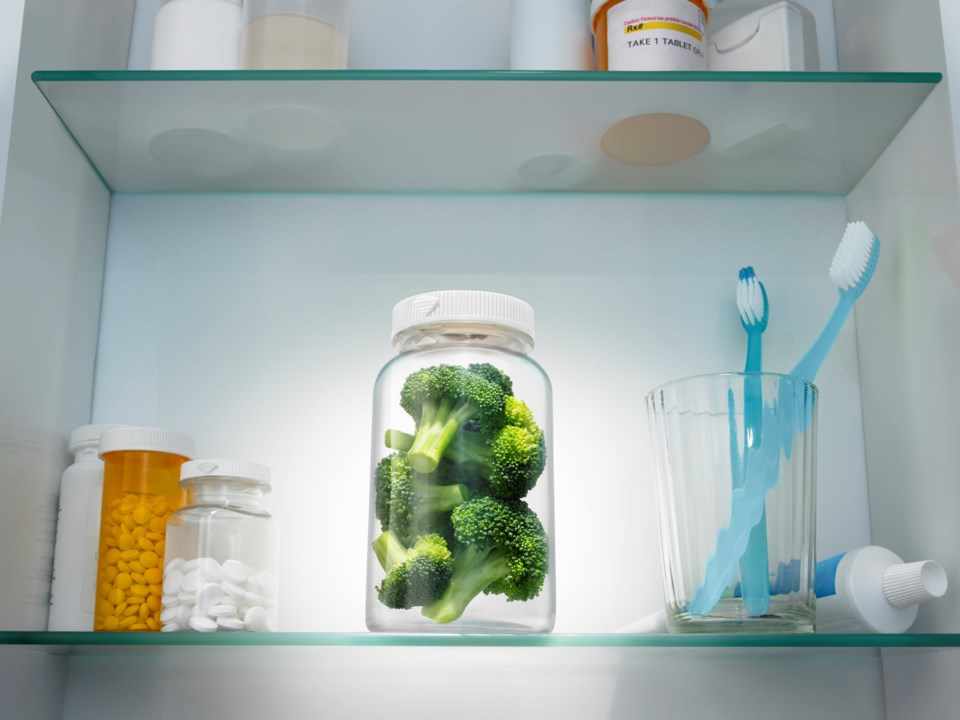Anyone who has heard my views on eating an anti-inflammatory diet knows my feelings and opinions on the topic of food and natural remedies versus pharmaceutical medications. Except for chronic and life-threatening issues, I am a firm believer that food, herbal and/or homeopathic options should be considered as our first pharmacy.
I am very grateful to big pharma for the knowledge, expertise, research and development of modern medications, as I have two family members who would not be alive without pharmaceutical intervention. However, I feel that medication is often overused. After my own diagnosis of osteoarthritis, osteoporosis, degenerative bone disease and fibromyalgia in 2015, I took the advice of my Vancouver doctor and went on anti-inflammatory medications (including prednisone) which caused unsavory side effects that required several additional medications to treat. Taking multiple medications is a common conundrum known as polypharmacy (the administration of several medications to treat a single disease) and can cause adverse drug interactions and disastrous long-term health consequences.
For my own health, I wanted to lessen or eliminate the medications prescribed to me. I knew in my heart that I needed to get off the meds, as I had gained 30 pounds, had a medication induced ulcer and didn’t even feel like myself anymore. My Vancouver doctor told me I would be on these anti-inflammatory meds for the rest of my life and when I was visibly upset, he wrote me a prescription for anti-depressants. This was the final straw and a pivotal turning point for me, starting many years of in-depth research into which foods caused inflammation, and which foods could help decrease inflammation. Within four months, I was off all medication and relatively pain free. Within six months, I had regained all my mobility and had the energy of my 30-year-old self. Taking control of my own health through research, trial, and error was scary and required trust and confidence. I don’t recommend this route for everyone, but educating ourselves about our health and cleaning up our diets is never a bad idea.
Doctors specialize in diagnosis and prescribing pharmaceutical treatment options. Rarely do I hear about a doctor suggesting specific dietary changes to prevent or treat a condition (except when it comes to heart disease and type 2 diabetes). And if a doctor does offer nutrition advice, it will typically be a recommendation to cut down or eliminate common foods that are known to exacerbate disease (alcohol, sugar, carbs etc.) rather than recommending foods or herbs that could help with a particular health condition. I think it may be a liability issue for them. This is where a naturopath, herbalist, dietician, homeopath, traditional Chinese medicine doctor or health coach can help. I feel that people with health issues should elicit the advice of at least one alternative therapist also. All of these practitioners are trained to safely treat their patients and clients.
Pharmacists are trained to assess the safety of pharmaceutical medications prescribed by a doctor when it comes to contra-indications with other medication. Natural remedies are often the healthier option for sure, but they are not without risks. I remember my mother buying a plethora of natural products that she regularly saw advertised on late-night television, stating that they were ‘natural’ and therefore could not be harmful. When I started researching their ingredients, I found many that she should not be taking with her existing medications. This is the reason that doctors (rightly so) would prefer that their patients only follow their prescribed specific medication protocol.
Unfortunately, the majority of doctors are not trained in disease avoidance through nutrition, or how to use food as pharmacy. There is a general belief that doctors only receive a day or two of basic nutritional training in their whole degree. I am not sure if this is true today (or ever) but I have heard from many of my own clients that their doctors told them their inflammation has nothing to do with their diet. In my opinion it is a disservice to say this to patients (especially those with terrible diets). When the body says no to our abusive treatment of it, inflammation is how it often speaks to us. To be clear, not all inflammation is diet related but if one has a medical condition, proper diets should be part of the health treatment. Food can hurt and food can heal, and eating an anti-inflammatory diet should always be considered.
Our ancestors understood which foods and plants to use as medicine and it is time to remember and relearn how nature provides for us through plants and herbs in the food we eat and the teas we drink.
Claire Nielsen is a health coach, author, public speaker and founder of www.elixirforlife.ca. The information provided in the above article is for educational purposes only and is not a substitute for professional health and medical advice. Please consult a doctor or healthcare provider if you're seeking medical advice, diagnoses and/or treatment.




